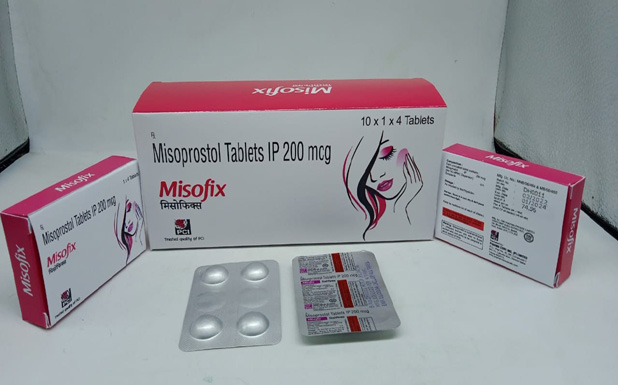Misoprostol is a synthetic prostaglandin E1 analogue that is used for variety of indications in the practice of obstetrics and gynecology, including medication abortion, medical management of miscarriage, induction of labor, cervical ripening before surgical procedures, and the treatment of postpartum hemorrhage.
Misoprostol's effects are dose dependent and include cervical softening and dilation, uterine contractions, nausea, vomiting, diarrhea, fever, and chills.
Therapeutic Indication
For cervical ripening, prevention of post partum haemorrhage & First trimester of abortion with mifepristone
Uses:
- Misoprostol is an effective cervical ripening agent prior to first – trimester surgical abortion.
- Misoprostol for cervical ripening as a substitute for laminaria prior to second trimester dilation and evacuation is only recommended under 16 weeks of gestation.
- Misoprostol is an effective cervical ripening agent in premenopausal women prior to hysteroscopy. The greatest benefit is seen in nulliparous women and for operative hysteroscopy. Whether the routine use of misoprostol prior to hysteroscopy is beneficial is still unknown.
- Misoprostol for cervical ripening prior to gynecologic procedures in postmenopausal women has not been found to be effective.
- Misoprostol is an option for the management of early pregnancy failure and incomplete abortion in women who are hemodynamically stable without signs of infection. A single dose of 800 µg vaginally is typically used.
- Misoprostol is a proven induction agent in the second trimester for termination of pregnancy or fetal death. For cervical ripening, prevention of post partum haemorrhage & First trimester of abortion with mifepristone.
Pharmacology
Pharmacodynamics:
Misoprostol, a prostaglandin, binds to myometrial cells to cause strong myometrial contractions leading to expulsion of tissue. It also causes cervical ripening with softening and dilation of the cervix.
Pharmacokinetics:
Absorption: Rapidly absorbed from the GI tract (oral). Peak plasma concentration in 15-30 min.
Metabolism: Rapidly metabolised to misoprostol acid (active form).
Excretion : Mainly via urine. Elimination half-life: 20-40 min.
Drug Interactions
Misoprostol has not been shown to interfere with the beneficial effects of aspirin on signs and symptoms of rheumatoid arthritis. Misoprostol has no clinically significant effect on the kinetics of diclofenac or ibuprofen. The most common side effects of Misoprostol are diarrhoea and abdominal pain. These side effects may be increased if Misoprostol is taken concurrently with antacids.
Warnings & Precautions
This has been prescribed for the patient's specific condition. It may be dangerous to any other non pregnant lady.
Conditions where hypotension might precipitate severe complications e.g. cerebrovascular or CV disease. Inflammatory bowel disease. Patients prone to dehydration. Elderly. Renal impairment.
Pregnancy & Lactation:
Misoprostol is contraindicated in women who are pregnant, or who are planning a pregnancy as misoprostol increases uterine tone and contractions in pregnancy.
Misoprostol acid may be excreted in colostrum (the excreted by the breasts for the 3 – 4 days after delivery) and breast milk, but the level and duration is expected to be very limited and should not hinder breast-feeding.
Adverse Drug Reactions
Diarrhoea, abdominal pain, dyspepsia, constipation, flatulence, nausea and vomiting; abnormal vaginal bleeding, cramps, increased uterine contractility, headache.
Storage
Store in a cool, dark & dry place.
Keep out of reach of children
Disclaimer:The data uploaded is made from content already available on internet.The company holds no right of it and is not responsible for any wrong information.
